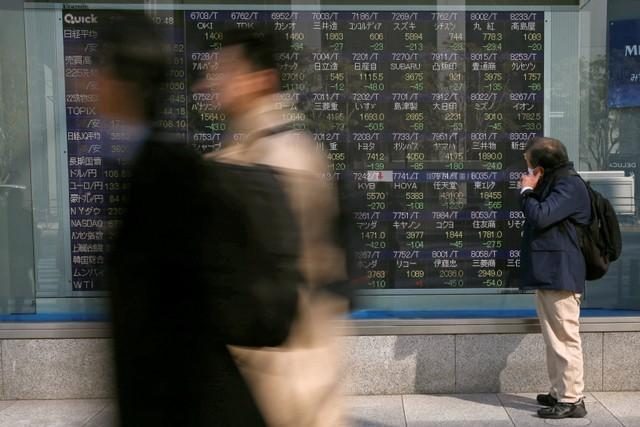TOKYO — Stock markets in Asia extended a selloff on Wall Street as investors were rattled after President Donald Trump announced the United States would impose hefty tariffs on steel and aluminum imports, raising the specter of a global trade war.
Early on Friday, MSCI’s broadest index of Asia-Pacific shares outside Japan dipped 0.2 percent while Japan’s Nikkei tumbled 2.4 percent.
On Wall Street, the S&P 500 lost 36.16 points, or 1.33 percent, to 2,677.67 on Thursday, coming a day after the investors sold off heavily on worries the Federal Reserve might increase rates more than expected this year.
Trump said the duties of 25 percent on steel and 10 percent on aluminum would be formally announced next week, although White House officials later said some details still needed to be ironed out.
Investors fear Trump’s decision could spark retaliatory moves from major trade partners like China, Europe and neighboring Canada in a blow to the global economy.
The anxiety was underscored by Canada’s quick response, with officials in Ottawa saying they will retaliate against any U.S. tariffs on steel and aluminum products.
The concerns of a harmful trade war eclipsed the upbeat U.S. economic data published on Thursday, including a rise in the manufacturing index to 14-year highs and another showing the number of Americans filing for unemployment benefits hitting a 48-year low.
U.S. inflation picked up as the PCE price index, a gauge of underlying inflation, advanced 0.3 percent in January – the largest gain since January 2017. On the year, it posted an increase of 1.5 percent, same as the previous two months.
“Even if you manufacture goods, if someone doesn’t buy them, you have to scale back your production, leading to slowdown in global economic activities,” said Daisuke Uno, chief strategist at Sumitomo Mitsui Bank.
“I would expect markets entered another period of correction,” he added.
U.S. Treasury yields fell as the risk of a trade war appeared to push aside considerations of inflation, a major theme that spooked global financial markets earlier this year.
The 10-year U.S. Treasuries yield fell to 2.811 percent, hitting its lowest level in three weeks and further extending the distance from its four-year peak of 2.957 percent touched on Feb 21.
In the currency market, the dollar’s rebound following the bullish comments on the U.S. economy from new Federal Reserve Chair Jerome Powell on Tuesday lost steam.
The euro jumped back to $1.2271, after having hit a seven-week low of $1.21545.
The dollar slipped to 106.12 yen, edging back towards its 15-month low of 105.545 set on Feb 16.
Oil prices were also under pressure, having fallen more than one percent the previous day as Trump’s trade move raised worried about the global economy.
U.S. crude traded at $61.23 per barrel, up 0.4 percent in Asia on Friday after having fallen to two-week low of $60.18 on Thursday. It is down 3.7 percent so far this week.










